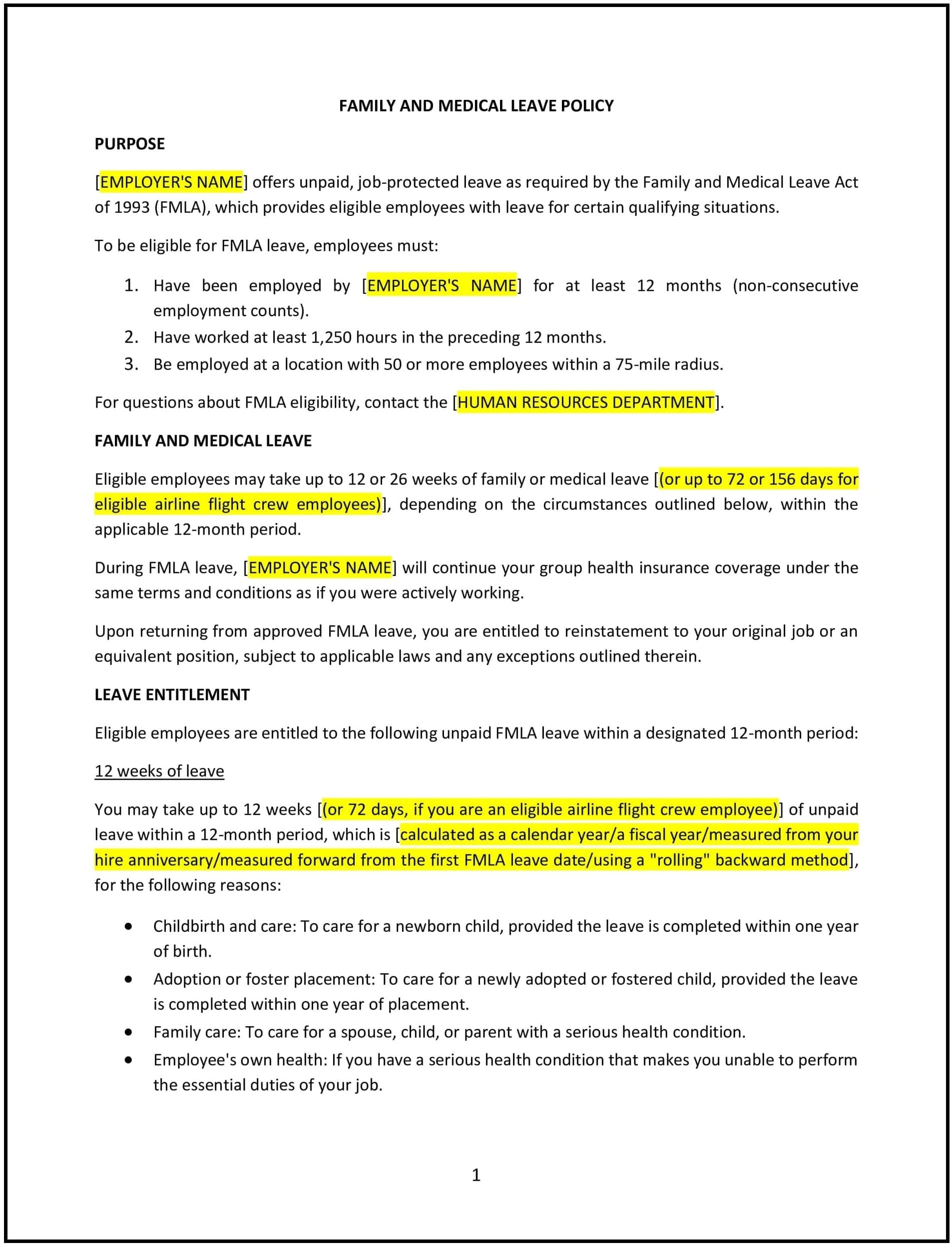Family and medical leave policy (New Hampshire): Free template
Got contracts to review? While you're here for policies, let Cobrief make contract review effortless—start your free review now.

Customize this template for free
Family and medical leave policy (New Hampshire)
A family and medical leave policy helps New Hampshire businesses provide employees with the time off they need for personal medical reasons, the care of a family member, or for the birth or adoption of a child. This policy outlines the eligibility criteria, process for requesting leave, and the benefits employees can expect during their time away from work.
By adopting this policy, businesses in New Hampshire can support their employees’ work-life balance, reduce absenteeism, and ensure compliance with applicable state and federal regulations.
How to use this family and medical leave policy (New Hampshire)
- Define eligibility: Specify which employees are eligible for family and medical leave, including the length of employment required and the number of hours worked in the past 12 months.
- Outline leave types: List the types of leave covered by the policy, including medical leave for personal health conditions, leave for the care of a family member, and leave for the birth, adoption, or fostering of a child.
- Establish notice requirements: Set clear guidelines for how employees should request family and medical leave, including how far in advance they must notify the employer and any necessary documentation, such as a doctor’s note or birth certificate.
- Explain leave duration: Clarify the amount of leave available, including any statutory requirements under New Hampshire state law, federal laws such as the Family and Medical Leave Act (FMLA), and company-specific provisions.
- Describe benefits during leave: Explain what benefits employees will receive while on leave, such as continuation of health insurance, paid time off (PTO) policies, or unpaid leave options.
- Ensure job protection: Include provisions that guarantee employees can return to their same or an equivalent position following their family or medical leave, in line with New Hampshire state law and FMLA.
- Address compensation: Specify whether the leave is paid or unpaid, and outline any policies for using accrued PTO or sick leave during the leave period.
- Set expectations for intermittent leave: If the leave is intermittent or on a reduced schedule, outline how this will be handled, including scheduling expectations and the process for tracking hours.
- Review and update: Regularly review and update the policy to reflect changes in New Hampshire state regulations, federal laws, or company practices related to family and medical leave.
Benefits of using this family and medical leave policy (New Hampshire)
This policy provides several benefits for New Hampshire businesses:
- Supports employee well-being: By offering family and medical leave, businesses demonstrate care for their employees’ health and personal needs, which can improve employee morale and loyalty.
- Reduces turnover: Offering family and medical leave helps businesses retain employees who may otherwise be forced to leave due to health or family reasons, reducing recruitment and training costs.
- Enhances work-life balance: A clear and accessible family and medical leave policy helps employees balance work with personal and family responsibilities, promoting overall job satisfaction.
- Minimizes legal risks: By aligning the policy with state and federal regulations, businesses can avoid legal challenges related to leave entitlements, ensuring compliance with laws such as the FMLA.
- Increases productivity: When employees are supported with the ability to take necessary time off, they can return to work refreshed and ready to contribute, reducing burnout and absenteeism.
Tips for using this family and medical leave policy (New Hampshire)
- Communicate the policy clearly: Ensure all employees are aware of the family and medical leave policy, including eligibility, how to request leave, and what benefits they will receive during their time off.
- Provide training: Train managers and HR personnel on how to handle leave requests, including how to evaluate eligibility, communicate with employees, and maintain confidentiality during the process.
- Track leave accurately: Use HR software or other systems to track leave requests and ensure compliance with policy terms, such as the duration of leave and the type of leave taken.
- Be consistent: Apply the policy consistently across all employees to avoid discrimination or favoritism.
- Accommodate special needs: Be flexible with employees who may require accommodations for family or medical reasons, especially for employees who need intermittent leave.
- Review periodically: Review the policy annually or whenever there are changes to New Hampshire state laws or federal regulations to ensure it remains effective and up to date.